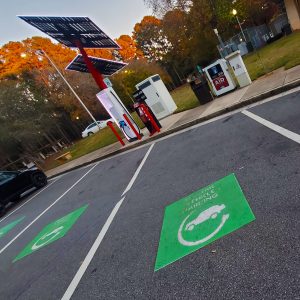Gold Dome Digest: Georgia Legislators Charge Boldly Towards The Future
On Monday, Georgia House legislators overwhelmingly approved Senate Bill 146 making the state one step closer to being the electric vehicle capital of the nation. The bill is approved just weeks after the UN released the IPCC’s “Climate Change 2023: Synthesis Report”. The report emphasized the urgency of quick action to cut emissions in half buy 2030. If the bill becomes law, Georgia will be the 5th state to implement a kilowatt by hour program.
 The bill has the potential to modernize the transportation horizon by establishing regulations and taxes like a gas fill up but for an electric car charge. Soon, an EV owner can drive up to the convenient store and ‘fill up’ by the kilowatt hour. A prediction by advocacy group Environment Georgia estimated the increase of EV ownership from 1% to 10% by 2030. Future and current EV owners would now have greater access to stations for short and longer commutes. The legislation would begin January 1, 2025, giving all involved ample time to create an organized plan. The Department of Agriculture will be tasked with enforcing, permitting, inspecting, and regulating the charging stations.
The bill has the potential to modernize the transportation horizon by establishing regulations and taxes like a gas fill up but for an electric car charge. Soon, an EV owner can drive up to the convenient store and ‘fill up’ by the kilowatt hour. A prediction by advocacy group Environment Georgia estimated the increase of EV ownership from 1% to 10% by 2030. Future and current EV owners would now have greater access to stations for short and longer commutes. The legislation would begin January 1, 2025, giving all involved ample time to create an organized plan. The Department of Agriculture will be tasked with enforcing, permitting, inspecting, and regulating the charging stations.
Bumps along the way are expected for anything newly implemented. Legislators and EV owners were both worried extra taxes will be placed on the already annual $217 dollar registration fee for electric vehicles. The tax fees are used to help maintain roads and bridges. Currently, most EV’s are used for short distances and no taxes are charged for vehicles charged at home. Hoping to smooth the tax bumps and continue the path to lower emissions, the state is assessing whether there can be a fee plan based on the amount of miles driven by the EV owner. The most prominent change made by the House before sending the bill back to the Senate for ultimate approval was to lower the 3.47 cents per kilowatt hour to 2.84 cents. Lawmakers made this change with the realization Georgia would be charging the highest excise tax in the nation. The change put Georgia more toward the middle of the group rather than being at the top.
With The City of Atlanta’s Climate Action Plan highlighting 40% reduction of GHG emissions produced by transportation by 2030, Bill 146 will contribute movement toward the goal. Atlanta’s Regional Transportation Electrification Plan began consulting work activities in Q1 with the expectation of completion by the end of 2023, the passage of the bill can now be included in the preparation for the assessed needs and implementation of strategies. Under this section, developing and planning new location sites for charging equipment will be easily identified with convenient stores and other retailers expected to provide most of the stations. With an additional 600,000 public chargers needed by 2026, the bill could not be passed soon enough.
“You’re fixing to see a change in this country,” state Rep. Alan Powell, R-Hartwell, said shortly before passing the EV bill. “This is to get us prepared for the future.”
Teresa Perkins is a climate change and sustainability journalist, who is creating research-based climate change content pertaining to sustainable energy at local, national, and global level for publication and distribution. She partners with non-profit organizations for innovative ideas and sustainability projects and connects global UN Climate Change reports to local initiatives.





